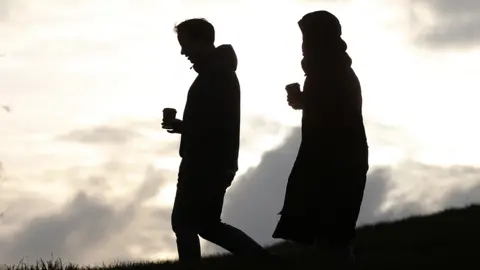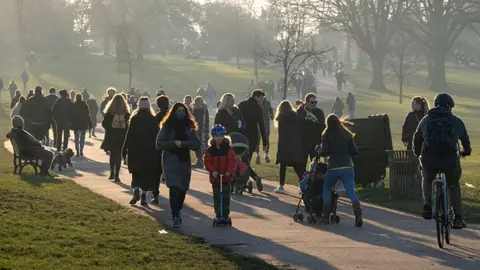Covid: Can you catch the virus outside?
More of us are now able to meet up outside with friends and family.
"The evidence is very clear that outdoor spaces are safer than indoors," Prof Chris Whitty, the UK's chief medical officer, has said.
What makes the outdoors safer?
Researchers say infections can happen outdoors, but the chances are massively reduced.
Fresh air disperses and dilutes the virus.
It also helps to evaporate the liquid droplets in which it is carried.
On top of that, ultraviolet light from the Sun should kill any virus that's out in the open.
Even so, there are a handful of cases where it's believed that infections did happen outside.
One study found that two men in China talking face-to-face for at least 15 minutes was enough to spread the virus.
 Getty Images
Getty ImagesHow close are you to others?
If someone's infected - maybe without realising it because they have no symptoms - they'll be releasing the virus as they breathe, especially if they cough.
Some of that will be carried in droplets, most of which will quickly fall to the ground but could reach your eyes, nose or mouth if you're within 2m (6ft) of them.
So the advice is to avoid being face-to-face if you're that close.
The infected person will also release smaller particles called aerosols.
Indoors, these can accumulate in the air and be a hazard. Outside they should rapidly disperse.
How long are you together for?
Walking past someone in the street or having a jogger run by you, means you're close together for a few seconds at most.
Fleeting encounters are highly unlikely to be long enough for enough virus to reach you.
Prof Cath Noakes, an airborne infection expert from the University of Leeds, says someone would have to cough right at you, at the moment you're inhaling, for an infection to happen.
But she also warns of friends spending a long time together outdoors and assuming they're completely safe.
Going for a run with someone and following close behind them for 20 minutes or more, breathing in their slipstream, might be a problem, she says.
"The sad fact is that your greatest risk is from the people you know."
 EPA
EPAAre you properly out in the open?
Scientists have found that the risks are low in fully open spaces.
But they worry about areas that are not just crowded but also partly enclosed, such as market stalls or bus shelters.
Whenever the air is still, it can become stagnant and contaminated.
It's in environments like narrow pathways or busy queues that government advisers say face coverings may be needed.
Can you catch it from surfaces?
If an infected person coughs into their hand and then wipes it on a surface, the virus may survive there for hours.
Researchers in the US found virus on the handles of rubbish bins and the buttons at pedestrian crossings.
They reckon this may have led to infections in the area, though at a relatively low level compared with other ways of spreading the virus.
In colder weather, the virus may last longer in the open - it thrives in low temperatures.
Added to that, your nose runs in the cold, and a common reaction is to wipe it with your hand.
That might raise the chances of surfaces becoming contaminated.
However, many scientists now think that the amount of virus likely to be left on a surface in this way would be minimal, and would disperse within an hour or two.
"The chance of transmission through inanimate surfaces is very small," says Prof Emmanuel Goldman of Rutgers University.
 Alamy
AlamyWhere are the risks greatest?
All the evidence points to the vast majority of Covid infections happening indoors.
The virus is transmitted through human interaction, especially when people are together for a long period of time.
That means the virus can spread in several different ways.
Either infected droplets can land on people close by, or contaminate surfaces that others touch.
And if rooms are stuffy, tiny virus particles can accumulate in the air and get inhaled.
It's in households where all of this is most likely to happen.

- LOCKDOWN LOOK-UP: The rules in your area
- SOCIAL DISTANCING: Can I give my friends a hug?
- GLOBAL SPREAD: How many worldwide cases are there?
- LOOK-UP TOOL: How many cases in your area?


